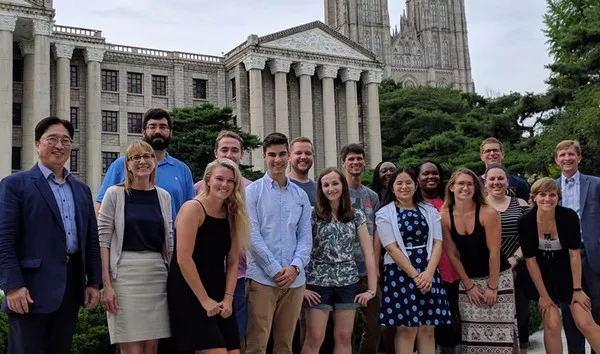The American Health Care Association is one of several groups representing various sectors of the healthcare industry that have joined together in a new coalition to urge Congress to act on critical workforce and immigration solutions.
The new Healthcare Workforce Coalition, whose formation was announced Thursday, will focus on training new nurses and physicians, retention and recruitment of international healthcare workers.
“Together, we can work to achieve our shared goals of recruiting and retaining more individuals to work in the healthcare industry,” AHCA/NCAL told McKnight’s Long-Term Care News in an email Friday. “Nursing homes, in particular, have experienced the worst loss of staff due to the pandemic, and we hope that joining forces with other leading coalition members will collectively improve our workforce crisis.”
The coalition comes as Congress is mired in inaction, about to enter its third week without a Speaker of the House. As a result, it is unable to act on any legislation – including several existing bills aimed at boosting the US workforce. The group said it would focus its efforts on “common-sense solutions” now and in the years ahead.
“Across the country, no community or sector has been spared the challenges posed by this workforce crisis – especially as the population ages and demand for health care services continues to rise,” the coalition said in a press release.
“Eighty-five percent of healthcare facilities are facing shortages of allied healthcare professionals. These critical providers face violence in the workplace, understaffing, and an aging workforce, leading to burnout and increased turnover rates,” the coalition added. “Meanwhile, the nation’s educational pipeline is struggling to fill these gaps, as a lack of academic preparedness is causing students to delay or forgo nursing school, and limited program capacity has forced US nursing schools to turn away 78,191 qualified applications in 2022 alone. There must be a concerted effort to reverse this concerning trend.”
The breakdown
The coalition estimates the US must double the number of new graduates entering and staying in the nursing workforce every year for the next three years to supply the 275,000 additional nurses the National Institutes of Health predicts will be needed by 2030.
Skilled nursing providers are especially anxious to fill deep holes in the staffing trenches, with a federal nurse staffing mandate bearing down on them.
The coalition urged Congress to quickly pass bipartisan proposals to bolster and protect the healthcare workforce, including the Safety from Violence for Healthcare Employees Act and Healthcare Workforce Resilience Act. The latter would direct 40,000 visas that went unused during COVID border closures to healthcare professionals, with 25,000 going to nurses. It has been embraced by AHCA and LeadingAge.
In addition to AHCA, initial members are the American Hospital Association, the Federation of American Hospitals, Shearwater Health, the American Society of Nephrology, Vitas Healthcare, Ascend Learning, the American Association of International Healthcare Recruitment, MedPro International, the National Rural Health Association, the National Hospice and Palliative Care Organization, and Avant Healthcare.
Its key goals are to:
- Increase healthcare student enrollment by expanding the capacity of educational programs and improving academic preparedness of potential students;
- Retain healthcare workers;
- Attract international skilled healthcare workers by raising awareness of the support provided by international clinicians and nurses.
“It is of critical importance to focus our combined efforts on policies aimed at educating, retaining, and increasing the number of nurses, physicians, and allied health professionals in the field,” said Ben Marcantonio, interim CEO of the National Hospice and Palliative Care Organization. “Every American deserves access to hospice and palliative care should they choose to receive it, and it is our duty as good stewards to ensure we have a robust workforce ready to meet their needs.”




















